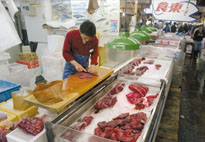Gourment Food Fears |
Shanghai Star. 16 May, 2002
 A fishmonger cuts fresh whale meat at Tokyo's Tsukiji fish market, the world's biggest. Some 2,314 tons of fish worth over $16 million are sold here daily. |
CAUTION: whale meat is hazardous to your health
That message to Japan's finicky consumers could end up being more damaging to Tokyo's hopes of resuming commercial whaling than years of campaigning by environmentalists focused on endangered species and the slaughter of the intelligent mammals.
"If it became more widely known that this meat was contaminated, people who want to eat whale would probably stop," said Koichi Haraguchi, a researcher at Dai-Ichi College of Pharmaceutical Sciences in western Japan.
"And people who think about trying it, wouldn't."
So far, though, most Japanese consumers seem blithely unaware that the whale meat they see as a gourmet delight may be tainted with dangerous mercury and toxic chemicals.
"The issue is largely unknown, that is the worst thing," said Nanami Kurasawa, secretary-general of the Dolphin and Whale Action Network, an environmental group.
"If people eat this contaminated meat unaware, especially young women and pregnant women, it could damage their health, or the health of their unborn children."
The health warnings could also be damaging to Japan's push to resume commercial whaling, a campaign it is mounting yet again at the annual meeting of the International Whaling Commission (IWC), which began in Japan on April 25 and ends on May 24.
Japan abandoned commercial whaling in 1986 in line with an IWC moratorium, but began what it calls scientific research whaling the next year.
Activists charge that much of this meat ends up on restaurant tables and store shelves, although whale now is an expensive, gourmet food that is only rarely eaten.
Just as well, experts say, since some of it maybe be tainted with mercury, cancer-causing dioxin, or polychlorinated biphenyls (PCBs), industrial chemicals linked to developmental delays and other health problems in humans and accumulate in fats.
Truth in labelling
 Mie Mizomoto, 27, holds a whaleburger made by Kujiraya ("Place of Whales", a shop in Shimonoseki in southwestern Japan. |
Creamy whale blubber, which may sometimes be dangerously high in PCBs, is considered a delicacy among delicacies, while other fatty products, such as whale bacon, are also widely available.
Researchers say there are few big problems with minke meat, which comprises the bulk of the whale caught in Japan's hunts.
Red minke whale meat is lean, lacking much of the fat that could contain PCBs, and the whales roam the wider oceans rather than more polluted coastal areas.
But even the red meat may not be totally safe if marbled with fat that makes it look tender and juicy, said Motoji Nagasawa, whale campaigner at Greenpeace Japan.
Potentially more worrisome, false labelling means not all the products for sale are guaranteed to be minke, or even whale.
"If you really look, there's a lot of meat out there on the shelves that isn't minke," said researcher Haraguchi.
Smaller species such as pilot whales, Baird's beaked whales and dolphins, are not subject to IWC restrictions.
As a result, stores unable to get their hands on genuine - and expensive - minke sometimes settle for something else.
"If it's actually labelled minke it probably is," Haraguchi said. "But if it's only labelled 'whale' it might be pilot whale or even dolphin. And this could be quite contaminated."
A random survey of 130 samples of whale products from shops around Japan, conducted in 1999 by international researchers, found serious contamination, according to Japanese consumer group Safety First.
Levels for PCBs ranged from 0.8 parts per million (ppm) for pilot whale blubber up to 8.9 ppm for dolphin meat and blubber, compared with the 0.5 ppm maximum permitted.
High concentrations of mercury and cancer-causing dioxin were also found.
"The average person doesn't eat whale that often, so if it's labelled 'minke' they can't distinguish the real thing, as they might with other meats they eat more often," said Kurasawa.
"If people know, and still choose to eat it, that is their choice," said Kurasawa. "But if people don't know and eat this unwittingly, it is not a good thing."
Food safety
So far, ignorance appears to be bliss.
"You don't eat whale all that often, after all," said Hiromi Kase, who works for a company selling seaweed.
"If I started worrying about contamination in food there'd be no end to it. Everything's in doubt these days."
Japan's consumers have had their trust in food safety battered by a recent rash of scandals involving mislabelled beef, pork and poultry and by an outbreak of mad cow disease last year.
"Whales are at the top of the food pyramid, so that any pollutants in the oceans concentrate in their bodies," said Yoko Tomiyama, chairwoman of the Consumers Union of Japan.
"It is the duty of the government to tell people about this."
Prompted in part by such concerns, the Japanese Health Ministry has just completed its first-ever tests of whale meat, with a report due out shortly, an official said.
"We want to guarantee food safety, to make sure things such as mercury and PCBs aren't a problem," a ministry official said. "There just wasn't a specific reason to look at this before."
But he noted that with total Japanese consumption of whale now, on average, only about 0.1 gram per day, it is not the most pressing problem.
"We will look into the situation, get full reports, and let consumers know so they can make a choice," he added. "If selling it in the market is unsafe, we will stop this."
(Agencies via Xinhua) Copyright by Shanghai Star.